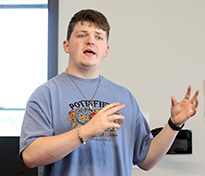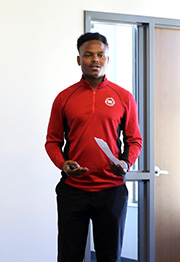The 15 students in Professor Shamira Gelbman’s PSC 211 class, Election Polls & Public Opinion, are strengthening their political literacy by studying polling through its history, methodology, and media influence.
Understanding political polls and how they are used is fast becoming a necessary skill during election season.
“There’s more polling than ever before, it’s become more complex, and there’s wide variation in how well different media outlets cover poll results,” said Gelbman, professor of political science. “Polling and media literacy is the most important thing for students to learn from this course in its current iteration.”
 On Oct. 3, the students presented information and facilitated a discussion with community members at a “Lunch with the League” event at Fusion 54. It was an opportunity to serve as experts and share ideas with others in an event sponsored by the Montgomery County League of Women Voters and the Community-Engaged Alliance.
On Oct. 3, the students presented information and facilitated a discussion with community members at a “Lunch with the League” event at Fusion 54. It was an opportunity to serve as experts and share ideas with others in an event sponsored by the Montgomery County League of Women Voters and the Community-Engaged Alliance.
“I really enjoyed it,” said Isaac Morrison ‘26. “It’s easy to think of what I’m learning in the classroom as confined to the classroom. When you can take that idea and go out and see people nodding, smiling, and learning something from you, it feels useful to apply in real life and help others in the process.”
The impact of political polls is not lost on these students.
“This class has shown me just how influential polls can be during election seasons,” said Olivier Tuyishime ’25, a political science major who resides in Indianapolis. “One simple poll about a particular political topic or candidate can swing the results of an election.”
Class discussions have shown the ways in which polling can impact voting, including bandwagon effects (polls show a candidate is likely to win), driving down voter turnout (election outcome seems a foregone conclusion based on reported poll results), or driving up voter turnout (polls show very close races, voters feel like their vote can actually make a difference).
“Polarization has bled into public discourse about polling and the legitimacy of polls, so it’s pushed me to refocus  the course on polling and media literacy in this latest iteration,” Gelbman said. “This was also the motivation for applying for the Community-Engaged Alliance grant in order to bring the students’ polling literacy learning to the broader campus and local communities.”
the course on polling and media literacy in this latest iteration,” Gelbman said. “This was also the motivation for applying for the Community-Engaged Alliance grant in order to bring the students’ polling literacy learning to the broader campus and local communities.”
Morrison has enjoyed learning about the history of polling and how it continues to evolve along with improvements in technology. He cited the fact that even though smartphones are commonplace now, it is harder to reliably reach people than it was back in the 1950s and ’60s when landlines were in practically every household.
“You’d think that with everyone having phones now in their pockets, polling would be easier,” said the PPE major from Wylie, Texas, “but there are so many challenges that come with it.”
It’s those challenges—sampling errors, demographics, quality of questions asked, and polarization—that interest the group and offer a unique perspective for Gelbman, who has taught this class in each presidential election year since 2012. While each offering is different, the level of interest is strong.
“I’ve been pleased with how engaged students are this year,” she said. “They’ve taken in the material well, asked good questions about it, and showed they can share that learning with voters in the local community.”
The PSC 211 students will be participating in another “Lunch with the League” on Oct. 31 to discuss exit polls.